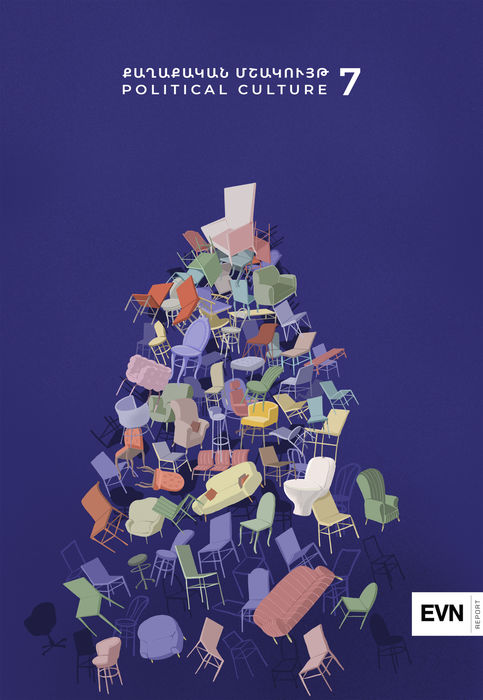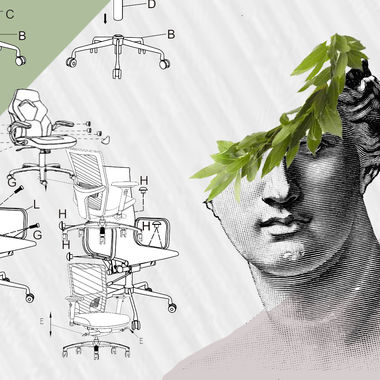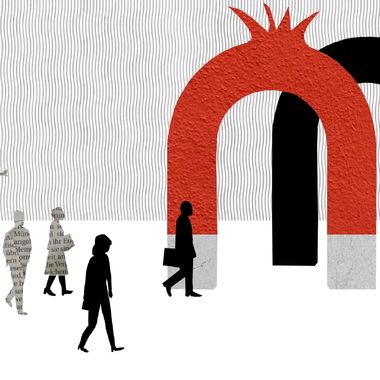
Illustration by Armine Shahbazyan.
Imperium semper est.[1]
Amid the ongoing pandemic, it is hard to deny the bigger role that states all over the world came to assume. The safety and health of its citizens is the primary obligation of a state, and also the main excuse when it comes to justifying numerous restrictions, new rules, partial or full lockdowns and expanding surveillance. The latter is manifested not least in the regulation of the type of materials and opinions that can be spread through social media.
This seems natural and hard to question—only an unreasonable person would take a stand against measures that are put in place to guarantee their safety. And yet, there are those who don’t feel comfortable with what they see as growing encroachments against individual rights and freedom. So, there’s room, somewhere between obedience and non-conformism, for a legitimacy crisis. There’s room for the growing alienation of people who become disillusioned with the state. The true question is perhaps the following: how to cope with this crisis, because this is only one among several others. Crisis is becoming a mode of being and goes back at least to the final decades of the 19th century.
The question of legitimacy, however, goes beyond our days and even beyond what in historical times can be seen as the immediate past, i.e., the modern times. Not to delve too much into ancient history, which even in its most exhaustive form is delivered only in bits and pieces, we need to turn to the Middle Ages, where through the relentless efforts of medieval jurists and sometimes the inadvertent actions of the Catholic Church, the rising territorial states derived their theoretical, or better yet, fictional foundations. From then on, we will work our way forward to our own days, and understand how various fictions were used to build legitimacy in different ages.
St. Augustine and the Changing Perception of Time
Our journey first takes us to the works of Plato, who held a great, though indirect influence over medieval minds. To observe one such example of an indirect Platonic influence, we need to look at the reign of Emperor Frederick II (1194-1250) of the Holy Roman Empire, who was often referred to as philosophissimus (the greatest lover of wisdom). This epithet in its turn goes back to Roman Emperor Marcus Aurelius (121-180 AD), who during his own lifetime and afterward was seen as a philosopher king. The idea of a philosopher king was first formulated by Plato in his Republic, and this idea was still alive and circulating among the jurists at the court of Frederick II. Plato’s concept described an ideal ruler who, as the name itself suggests, has a longing for wisdom and intelligence. Dante made use of this notion of philosopher king without even being aware of its proper origins. Thus, as the famous German-American historian Ernst Kantorowicz put it “Plato's rule over the medieval mind was sound; but it was noiseless,’’ as opposed to Aristotle’s to whom we shall turn later.[2]
Consequently, we need to look at the work of St. Augustine, who in his own right was a bearer and conveyor of Platonic ideas, to better understand the issues that preoccupied the medieval mind when the territorial states were slowly coming to their own. Specifically in his work City of God, St. Augustine makes a division between the civitas terrena (literally earthly city) and civitas Dei (city of God). While the former was seen as something temporal, Augustine himself refers to the example of Assyria and Babylon to show that Rome, just like the former, is only temporal. The latter, the city of God, is eternal, and this is the place where all true Christians should be elevated to, once leaving the temporary world. Augustine’s prevalence was also notable in another, perhaps far more important, field in the understanding of the concept of Time. The Augustinian perception of Time suggested that time (tempus), as opposed to eternity (aeternitas), is only temporary and that the material world had a beginning and consequently an end. Furthermore, according to St. Augustine’s duality, the end was imminent not only for individual human beings, but also for humanity as a whole.[3]
This view was soon challenged by the rediscovery of the work of Aristotle, who in his works viewed the world as an entity that had no beginning and is therefore infinite. In light of the Aristotelian ideas about the world, the scholastics of the late 13th century had to broaden their understanding of Time in order to account for a phenomenon which could not be answered by Augustine’s duality. Hence, a third and intermediary Time, aevum, was created, which was between eternity and time allocated to mortals. Aevum in the scholastic works became the time of the angels, who were accordingly seen as intermediaries between God and humans. The secular world, however, took this notion and ascribed to aevum the continuity of humanity in general. Individuals were still mortal but the community, the species and by extrapolation the political realm were quasi-immortal. While in practice the continuity of political and legal entities was in place even before the change in theory, this change helped to further solidify the practice, and one might even say added legitimacy to the process. Thus, the renewed assurance and belief in the continuity enabled the territorial states to impose themselves even more in the lives of their subjects.[4] The primary effects were seen in the fulfillment of the constant necessities of these territorial states: now that there was continuity, one could think about unexpected future needs. Kantorowicz sums up this phenomenon in the following words:
‘‘Public taxation, in the earlier Middle Ages, was always extraordinary and always ad hoc, for taxes fell due not on the return of a certain date, but on the return of a certain event. The feudal aids were due for ransom of the lord, knighting of his eldest son, dowry of his eldest daughter, and, haltingly since the twelfth century, for the defense of the realm… the casus necessitatis… As is well known, the fourth case, the necessitas…, eventually flung the gates open to permanent annual taxation dependent not upon an event, but upon Time.’’[5]
Thus, the new perception of Time came to the territorial state’s aid for realizing the latter’s goals. The long-term effects of this fiction were influential in the formation of the idea of progress, because progress was always in the future, however distant it was. If the world is seen as infinite, even though the Christian belief in the end of the world did not go away, then progress itself was seen to be infinite. This belief that everything will be better in the future continued until the outbreak of World War I in 1914. Although the 20th century dismantled the myth about life becoming better with the passage of time, the technological aspect of the progress remained. Indeed, one may even see the prevalence of the promise of technological progress in modern day secular states, at least in the West, even though this phenomenon does not solely confine itself to the western world.[6]
Organological Representations of the Realm
If we follow the narrative in Kantorowicz’s The King's Two Bodies, another interesting fiction comes to our attention. Approximately from the 12th to 14th centuries, the exchange of ideas between the Church and the rising territorial states led to the secularization of the one and, at least initially, sanctification of the other. It should be stressed that, even though we confine ourselves to this specific timeframe, the influence of the Church, canon law and Christianity in general for legitimizing political aims go even further back to the 9th or 10th century. Within our chosen period, however, the transfer of one notion, corpus mysticum, to the political sphere led to the creation of a fiction, which helped define the then-vague idea of a political unit in general.[7] The concept corpus mysticum was defined by Pope Boniface VIII in 1302: “Urged by faith, we are bound to believe in one Holy Church, Catholic and also Apostolic… which represents one mystical body [corpus mysticum], the head of which is Christ…”[8]
By adapting the concept of mystical body to the whole of the Catholic Church, Boniface VIII firstly defined the corporate nature of the Church itself and secondly, and perhaps more importantly, gave a secular meaning to a term that once had but a ceremonial use. Since the term came to represent the Church as a corporation, it became easier for the jurists to gloss over it and interpret it from their more politically-driven standpoint. Even before this, attempts have been made to compare the political unit with a human body, where the king is the head. A notable example is John of Salisbury (1110-1180), who came up with the famous line respublica corpus quoddam (republic is a sort of body).[9] Thus, when the opportunity presented itself to add a mythical, fictional dimension to the secular presence of the realm, it was immediately snatched by the jurists. The corporate and mythical nature of the realm later led to the further division of body politic and body natural of the king, yet another fiction this time invented by the English jurists. While the first was eternal and did not die, because the political realm itself, be it a Kingdom or an Empire, cannot die,[10] the second was seen as the mortal person of the king, who will be replaced by his successor. Naturally, a number of other fictions had to be devised by the jurists to reach from corpus mysticum of the king and his people to the body politic and the body natural of the king. Hence, the fiction about corpus mysticum of a realm was used to convey the idea of the wholeness of that realm, where both the subjects and the king representing them became part of that fictional body, which could never die. This fiction led to the solidification of the territorial state and its slow but steady rise. Needless to say that, much like the fiction of Time, it added legitimacy to the political realm, in that it helped to define what constitutes that realm and reinforce the authority of the king or the ruling people, because a body cannot act without the head.
The State That Failed: Armenian Attempts at Creating a Political Unit
The theories or fictions described in the preceding paragraphs remain part of the western canon, and cannot be extrapolated onto the rest of the world. Hence, here it will be an interesting detour to look at the peripheries of the Empire, specifically Armenia where a similar and yet also a different process was taking place parallel to the rise of the western territorial states. Firstly, Armenia was not fully under the influence of the Roman law, even though attempts were made to introduce Roman law into public life during the Bagratuni dynasty.[11] The Armenian Kingdom of Cilicia went even a step further and did adapt Roman law, even though there, as earlier in Bagratid Armenia, the Armenian common law was in application. The basic idea again was that the king was appointed by God and therefore can rule by divine right. The idea naturally has some overlaps with the developments about kingship in the western world. In the case of the Bagratunis, the dynasty’s claim to be derived from the biblical King David is certainly an attempt at fictional legitimacy. Moreover, the king was seen to be on equal footing with the Catholicos. Thus, the re-birth of the political unit in Armenia had strong Christian/religious origins.
In actuality, the king had to have the support of nakharars (lords) to rule as a sovereign. Hence, the ruler of the realm was ruling not alone but along with his nakharars, much like the system in England, where the king had to take heed of his parliament.[12] In Bagratuni Armenia, the legal theory longed for centralized power. In practice, however, the power held by the king remained rather decentralized and within the boundaries of the common law. The end of the Bagratuni kingdom (1042-1045) led to the turmoil that eventually saw the decay of whatever attempts were made to introduce centralizing positive law.[13] The fact that Mkhitar Gosh came to write his codex (Դատաստանագիրք) in 1184 is only a symptom of that turmoil.
It is worth noting that, had the Armenian territorial state continued to flourish into later times, it would have perhaps followed a similar path to that of England, where again the practice of common law prevailed and, not only that, but also the king alone could not be sovereign. Thus, the western and the eastern peripheries of the Empire stayed loyal to their own traditions, and whatever influence the Roman law had it did not come into its own like it did in continental Europe.
Post-Westphalian Fiction of the State
The secularization process of the European polities continued after the late Middle Ages, and sooner or later the conflict between the state and religion had to be resolved in favor of the former.[14] The state managed to make religion, though as prominent a role as it still continued to play, a subordinate part of itself. As British intellectual historian Quentin Skinner makes it clear in his work, the distribution of French treaties on sovereignty and especially Italian handbooks in the run of the 16th century, brought about a change in terminology and introduced the concept of state. The latter concept was the offspring of raison d’état (in Italian ragion di stato) actively developed in this period, among others by the Italians Giovanni Botero and Francesco Guicciardini, which came into practice in the 17th century and in part paved the way for the rise of absolutism in continental Europe.
With this said, a particular development in the history of political thought took place in the 1640s and 1650s with the printing of the works of Thomas Hobbes, who was appalled at the civil war in England (1642-1651) and attempted to find a way of avoiding a similar scenario in the future. According to Hobbes’ theory in his Leviathan, the state itself is a persona ficta, a fictional person that can be only represented by a person or a group of persons who act on its behalf, such as a monarch or a parliament. Hobbes was careful enough to separate religion from the state, and did not stress the idea of a divine ruler. Instead, his idea was that the monarch or the parliament have legitimacy solely through the fact that the people, by covenant, have transferred their power to the sovereign, who then acts in the name of the state. The sole fact that there has been a transfer of power from the people to the sovereign means that the actions of the sovereign are legitimate, so far as they are conducted for the betterment of the state and its people. Hobbes also puts this fictional person, the state, within a perpetual or eternal frame.
It is interesting to jump forward a century and see how this theory proposed by Hobbes, which was adopted and recognized by many, came to its end.[15] In 1776, Jeremy Bentham, in his work A Fragment on Government, undertook the dismantling of legal fictions, and instead redefined everything by facts and real people. After the dismantling of this fictional person of the state, Bentham, as Skinner points out, arrives at the conclusion that the state is nothing more than the person or the group of persons that govern.[16] This view was adopted and cherished in the anglophone world of the 19th century, which most of all was defined by the coming of the nation-states and the idea of endless scientific and technological progress. Perhaps no one has described the utilitarian and anti-fictional aspect of the 19th century better than Charles Dickens, whose character Thomas Gradgrind in Hard Times pronounces the following words:
‘‘Now, what I want is Facts. Teach these boys and girls nothing but Facts. Facts alone are wanted in life. Plant nothing else, and root out everything else. You can only form the minds of reasoning animals upon Facts; nothing else will ever be of any service to them.’’
The 19th century states, increasingly deprived of the fiction, eventually found a source of legitimation in the nation itself.[17] The latter concept became actively propagated after the French Revolution (1789-1799). The nation itself, however, as the term imagined communities coined by Benedict Anderson suggests, had a fictional character of its own. One that would be exposed, exploited and in many ways exhausted in the 20th century. Finally, now from the perspective of the 21st century, it is clear that state-legitimacy based strictly on facts might not be as tenable as was suggested by Bentham.
Is the Fiction Dead?
One thing is certain: states today do not rely on lofty and mystic ideas to define themselves or claim legitimacy for their actions. The religious aspect is completely left out of the scene. The fiction is nearly obsolete, and yet is this the right path to follow? Can modern states survive without fiction? These questions cannot be answered definitively, but let us examine a final point before attempting a conclusive answer to either of the said questions. In the 21st century, we might be living in times when our understanding and perception of Time is changing again. A factor that potentially influences this change is primarily the climate crisis, with its apocalyptic narrative. Inter alia, one should also mention the legacy of the Cold War, i.e. the prospect of nuclear annihilation, and the beginning of the second Cold War, which might not be fought solely on economic grounds. One just has to look at the situation in Myanmar and keep an eye on Taiwan. All of the above are conducive to a situation where the future itself is under question.
One of the signs that support this conjecture is the fact that humanity is becoming less and less concerned with long-term effects and long-term planning. This short-term planning mindset of governments was exposed by the COVID-19 pandemic, where even the developed states of the West did not know how to cope properly. The only somewhat long-term plan is the Paris Agreement, which was planned for the year 2030, now only nine years away.[18] The political system, at least in democratic countries, might be a reason for the short-term planning. It is understandable that every ruling party just wants to be re-elected after four or five years, a notion that is known in political science as the cartel party, but this solely cannot account for the short-sightedness of modern societies. While our scientific and technological progress allows us to see further into the future, predict climate change, demographic changes or various natural phenomena, we fail to plan ahead for that. This can be ascribed to the possibility that humanity’s understanding of Time is changing once again.[19]
This then leads us back to our initial question of legitimacy. The crisis of legitimacy has been developing for at least a century. The dystopian novels of the 20th century tacitly hint at this fact, and the current pandemic merely exposed the existing crisis. The solution to this crisis cannot be found easily, but it may lay in the past rather than the present, because sometimes to move forward we need to take a step back.
Perhaps a new fiction, or a noble lie to evoke Plato again, is not a bad idea after all, a renewed belief in humanity’s, and by extrapolation, of the state’s fictional characteristics.[20] Ultimately, humans are the bearers as much as they are the originators of historical processes, and they cannot be completely understood or explained through the natural sciences or even with the help of new technologies. The material world alone is not sufficient for our progress; with humans there is always something more at play – imagined communities, fiction, memory and finally history, which is valid only in continuity, however long the interruptions or the span of the so-called Dark Ages.
----------------------------------------
[1] The Empire is sempiternal, from Corpus Juris Civilis. The term Empire in this article will be used to denote the Roman Empire and its descendants, i.e. the European territorial states and the Byzantine Empire.
[2] Ernst H. Kantorowicz, Plato in the Middle Ages, The Philosophical Review, 1942, p. 314.
[3] For more on Saint Augustine and his philosophy, see Gillian Evans’s Introduction in Saint Augustine, City of God, Penguin Classics, 2003, pp. x-lvii.
[4] Ernst H. Kantorowicz, The King’s Two Bodies, Princeton University Press, 2016, pp. 275-284.
[5] Ibid., p. 284-285.
[6] On this subject, see the article by Augusto Del Noce: Marxism Died in the East Because It Realized Itself in the West, Church Life Journal, 2020.
[7] Kantorowicz, The King’s Two Bodies, 2016, p. 193-232.
[8] Ibid., p. 194.
[9] ‘‘For a republic is, just as Plutarch declares, a sort of body which is animated by the grant of divine reward and which is driven by the command of the highest equity and ruled by a sort of rational management.’’John of Salisbury, Policraticus, Cambridge University Press, 2007, p. 66.
[10] It is essential to bear in mind the fact that the Roman law had an immense influence at this time and almost all the definitions and terms were in one way or the other derivatives of the Roman law. Thus, the concept of the Empire as such had a prominent place in the vocabulary of any given jurist. The separate parts of the Empire were seen as the continuation of it, and in this sense the Empire never dies.
[11] Naturally, the influence of Roman law in Armenia did not begin with the Bagratids; it had earlier history as well. However, it was in this period that a conscious attempt was made to integrate Roman law with the Armenian common law, one which failed because of the untimely collapse of the Bagratid kingdom. Even during the reign of the Bagratunis, Armenian common law was practiced in every province of the kingdom, and it had provincial differences as well. The lack of a centralizing codex, however, was not felt as deeply as after the fall of the dynasty. More on the subject: Josef Karst, Grundriss der Geschichte des armenischen Rechtes, Deutsche Verlagsgesellschaft, 1906, pp. 6-56.
[12] The first Bagratuni king, Ashot I, was elevated to the status of a king with the consent and the help of the nakharars. This is only one instance that showcases the ability of nakharars to influence the political situation in Armenia. Lynn Jones, Abbasid Suzerainty in the Medieval Caucasus: Appropriation and Adaptation of Iconography and Ideology, Gesta, 2004, p. 144.
[13] This strife between common and positive law is present even in the current Republic of Armenia. Professor Gregory Areshian mentioned, in his lecture held in the spring of 2017, that Armenians’ usage of the word justice (արդարություն) reflects the mentality of common law. Whereas in the case of positive law the legality (օրինականություն) or non-legality of a certain action should be discussed and not whether it is just or unjust. Hence, once again, we have a case where the system is trying to adhere to positive law, while the populace persists in its traditional mentality. The changing of this mentality will be the key for guaranteeing the success of the Armenian Republic, otherwise the discourse between the government and the people is faulty at best, since they think in different concepts.
[14] This whole process of gradual secularization can be traced back to the lines in the Gospel: ‘‘Render unto Caesar the things that are Caesar's, and unto God the things that are God's.” (Matthew: 22:21) This idea was first communicated to me by my Professor Gregory Areshian in the fall of 2019. In medieval Europe, the territorial state came into its own because of its fusion with theology. In Armenia, a similar process did not take place in the same rigor, or perhaps was cut short by external factors.
[15] German political philosophers of the time, such as Samuel von Pufendorf, adopted and modified Hobbes’s idea about the state.
[16] For more on the subject of Hobbes and Bentham, see: Quentin Skinner, From Humanism to Hobbes: Ch. 12 - Hobbes and the Concept of the State, Cambridge University Press, 2018, pp. 341-383. Skinner himself eventually comes to the conclusion that the fictional person of the state is perhaps too valuable of an idea to be disregarded in the present day world.
[17] The words of Italian jurist Pasquale Stanislao Mancini hint toward this development. In his inaugural lecture at the University of Turin titled Della nazionalità come fondamento del diritto delle genti (1851), Mancini says that not the states but the nations are the representatives of the people in international law. See: Theodor Schieder, Italien und die Probleme des europäischen Nationalstaats, in Nationalismus und Nationalstaat, Vandenhoeck & Ruprecht, 1991, p. 331.
[18] Compare this to the foresight of Jean-Baptiste Colbert, who in 1670 planted oak trees in the forest of Tronçais to supply the French Navy with materials to build boats from the 19th century onward. Colbert of course did not see the coming of the steamboat, but he planned far ahead of his time. Fernand Braudel, Civilization and Capitalism, Vol. II, Collins, 1983, p.240.
[19] The following articles explain more thoroughly what I only remarked about in my observations: Is humanity doomed because we can’t plan for the long term?, The greatest long-term threats facing humanity
[20] Here I want to thank Dr. Nerses Kopalyan for, among many other things, pointing out to me Plato’s concept, which in many ways is the source of all fictions that were developed in later ages.
Also see
Magazine Issue N7
Political Culture

Armenians are scheduled to return to the ballot box on June 20, in the third parliamentary election in five years. This election is being held at a time of crisis for the country, in the aftermath of the 2020 Artsakh War. It is notable that the conduct of elections and campaigning has evolved greatly over the last three decades. Documented cases of outright ballot-box stuffing have been relegated to the past, as new accountability measures like voter authentication devices (VADs), published scanned voter lists and videotaping most polling stations have brought a new level of transparency.
Since moving from a presidential to a parliamentary system with the 2015 constitution, the results of the 2017 and 2018 elections were not followed by street protests renouncing the results. So far, the June election looks to be one of the most competitive in the country’s history.
EVN Report’s May issue, entitled “Political Culture,” looks back on the evolution of democratic expression in Armenia, from the first parliamentary election in 1919 to political cartoons to the modern day.
The Unbearable Lightness of Democratizing: Armenia’s Political Culture from Velvet Euphoria to Post-War Melancholy
By Nerses Kopalyan
Tracing political cultural trends that have been formulating in Armenia through three short, yet fastly-developing, stages: prior to the Velvet Revolution, subsequent to the Velvet Revolution, and after the 2020 Artsakh War.
The 1919 National Elections
By Mikael Yalanuzyan
Although the short-lived First Republic of Armenia is often viewed through the prism of the government’s activities, such as military operations, state defense, social issues, and foreign policy, the electoral processes at the time parallel today’s reality.
A Wave of New Political Parties Crashes Onto the Scene
By Harout Manougian
Thirty-one founding congresses for new political parties have been scheduled since the start of the year, a quantity not seen since the country gained independence 30 years ago.
Caricature: From the Soviet Era to Independence
By Mikael Yalanuzyan
Political caricature was an inseparable companion of the newspapers that were being formed under the new freedoms of speech and the press of independent Armenia.
Latest Poll Numbers Imply a False Majority Election Outcome
By Harout Manougian
The latest phone survey about the coming parliamentary election in Armenia was recently released. The seat projection arising from the poll is problematic in that it foresees a false majority scenario. Harout Manougian breaks it down.
New on EVN Report
Getting to Choose the Least Bad Option
By Raffi Elliott
Armenians may be wary of going to the polls in the upcoming snap parliamentary elections, but democracy remains the only option on the ballot.
Digital Pomegranate and Distrikt: Connecting Tech to Sustainable Living in Gyumri
By Hovsep Markarian
Digital Pomegranate, already into its eighth year, has played an active role in shifting the image of Gyumri from a city of poverty and tragedy to a city with a viable future. Its new project, Distrikt, promises to be the first SDG compatible community in the world.
Emergency Medical Care: How Anticipating Catastrophe Makes a Difference
By Dr. Sharon Chekijian
Armenia is now in a teachable moment. It is time to double down on disaster preparedness and emergency care development by taking proactive measures and moving from reaction to prevention and mitigation.
Podcasts












